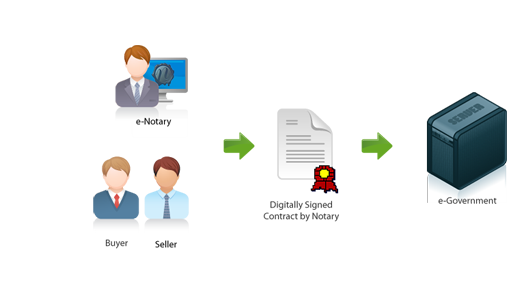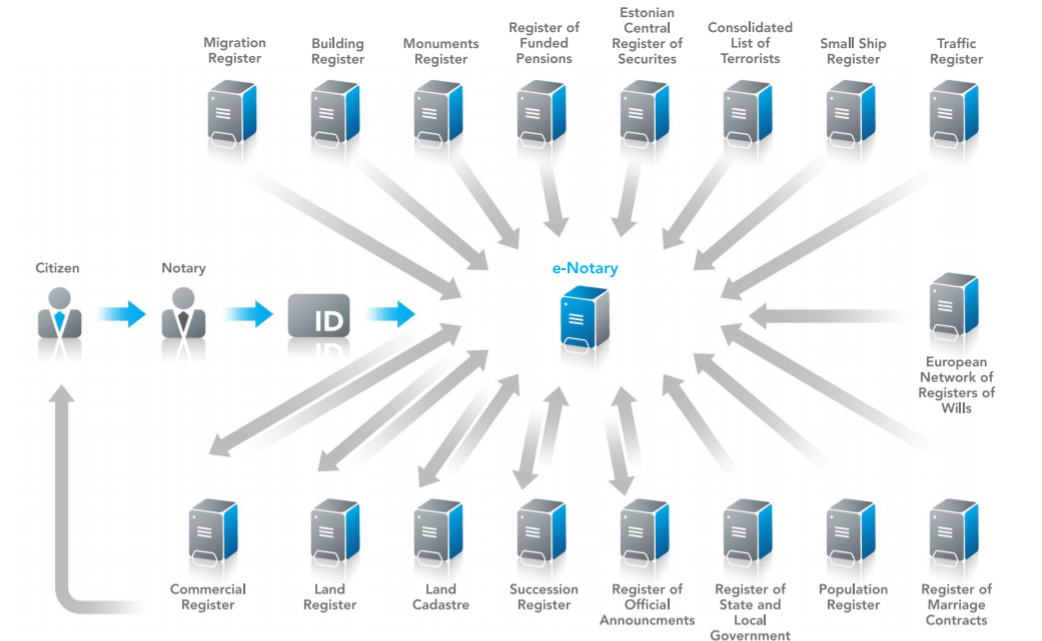General Information
Cases/Enablers
OOP Case
Appetizer
The e-Notary system environment allows notaries to making queries to 16 different registries, i.e. for drawing up and formulating the wording of contracts, forwarding contracts to various registers and monitoring the implementation process of contracts.
Short summary
The e-Notary system is an online environment, which helps notaries in their everyday work and allows electronic communication between notaries and the state. The environment allows notaries to do everything they need in their work. The system also allows making queries to 16 different registries (for example the Marital Property Register, the Official Announcements, the Estonian Central Registry of Securities, the Register of Constructions, the Land Register, the Traffic Registry, the Land Cadastre, the Succession Register, the Population Register, the Registry of Recreational Craft, the Business Register). The system is owned by the Chamber of Notaries and the servers are administrated by the Centre of Registers and Information Systems; the latter also provides user support, trains users and develops the system.
URL
Focus
Citizens
Business
Start date
Domain
Others
Scope
National/Federal
Country
Estonia
Nature and status of project
Rolled Out
Is the OOP case/enabler mandatory?
Mandatory
ENABLING ASSETS OR COMPONENTS
Relevant Enablers
Political commitment
Interoperability of the State Information System, Endorsed with the Directive of the Minister of Economic Affairs and Communications 11-0377, 22.12.2011, https://www.mkm.ee/sites/default/files/interoperability-framework_2011.doc
Legal interoperability
Notaries Act. Riigikogu, RT I 2000, 104, 684, https://www.riigiteataja.ee/en/eli/511032016002/consolide
-----------
Explanatory memorandum to the statute for keeping the e-notary information
system, https://riha.eesti.ee/riha/main?araTopServiceId=application&araThreadServiceId=j3WXs51v&araTransactionId=override
-----------
Notariaadimäärustik. Riigikogu, RT I, 25.09.2015, 5, https://www.riigiteataja.ee/akt/13261784?leiaKehtiv
-----------
Statutes of the electronic information system of notaries (e-notary), https://riha.eesti.ee/riha/main?araTopServiceId=application&araThreadServiceId=a5fJ5rvz&araTransactionId=override
-----------
Public Information Act. Riigikogu, RT I 2000, 92, 597, https://www.riigiteataja.ee/en/eli/518012016001/consolide
-----------
The classification system. Vabariigi Valitsus, RT I 2008, 4, 27, https://www.riigiteataja.ee/akt/12910889
-----------
The data exchange layer of information system. Vabariigi Valitsus, RT I 27.09.2016, 4, https://www.riigiteataja.ee/akt/127092016004
-----------
Explanatory memorandum to the statute for keeping the e-notary information
system, https://riha.eesti.ee/riha/main?araTopServiceId=application&araThreadServiceId=j3WXs51v&araTransactionId=override
-----------
Notariaadimäärustik. Riigikogu, RT I, 25.09.2015, 5, https://www.riigiteataja.ee/akt/13261784?leiaKehtiv
-----------
Statutes of the electronic information system of notaries (e-notary), https://riha.eesti.ee/riha/main?araTopServiceId=application&araThreadServiceId=a5fJ5rvz&araTransactionId=override
-----------
Public Information Act. Riigikogu, RT I 2000, 92, 597, https://www.riigiteataja.ee/en/eli/518012016001/consolide
-----------
The classification system. Vabariigi Valitsus, RT I 2008, 4, 27, https://www.riigiteataja.ee/akt/12910889
-----------
The data exchange layer of information system. Vabariigi Valitsus, RT I 27.09.2016, 4, https://www.riigiteataja.ee/akt/127092016004
Socio-cultural influence factors
Census procedures supported by census act, by strategic documents of Statistics Estonia.
All registers must linked by use commonly accepted keys:
• personal code for citizens,
• code of institution,
• standardised address presentation.
Secure data exchange layer X-Road (https://www.ria.ee/en/x-road.html) is used for gathering data from different registers. X-Road is a technological and organizational environment enabling a secure Internet-based data exchange between information systems. All registers and Statistics Estonia must be a member of X-Road
Information regarding the X-Road members and the services they provide is available via the Administration System for the State Information System (RIHA). RIHA (https://www.ria.ee/en/administration-system-of-the-state-information-system.html ) serves as a catalogue for the state’s information system. At the same time RIHA is a procedural and administrative environment via which the comprehensive and balanced development of the state’s information system has ensured. RIHA guarantees the transparency of the administration of the state’s information system and helps to plan the state’s information management.
PKI or the public key infrastructure (https://www.ria.ee/en/public-key-infrastructure.html ) enables secure digital authentication and signing. The infrastructure also allows forwarding data by using an encrypting key pair: a public encryption key and a private decryption key. In Estonia, this technology is used in relation with electronic identity (ID card, mobile ID, digital ID). All members of X-Road are using Digital seal certificates for signing messages. Citizens and officials are using electronic identity tokens.
All registers must linked by use commonly accepted keys:
• personal code for citizens,
• code of institution,
• standardised address presentation.
Secure data exchange layer X-Road (https://www.ria.ee/en/x-road.html) is used for gathering data from different registers. X-Road is a technological and organizational environment enabling a secure Internet-based data exchange between information systems. All registers and Statistics Estonia must be a member of X-Road
Information regarding the X-Road members and the services they provide is available via the Administration System for the State Information System (RIHA). RIHA (https://www.ria.ee/en/administration-system-of-the-state-information-system.html ) serves as a catalogue for the state’s information system. At the same time RIHA is a procedural and administrative environment via which the comprehensive and balanced development of the state’s information system has ensured. RIHA guarantees the transparency of the administration of the state’s information system and helps to plan the state’s information management.
PKI or the public key infrastructure (https://www.ria.ee/en/public-key-infrastructure.html ) enables secure digital authentication and signing. The infrastructure also allows forwarding data by using an encrypting key pair: a public encryption key and a private decryption key. In Estonia, this technology is used in relation with electronic identity (ID card, mobile ID, digital ID). All members of X-Road are using Digital seal certificates for signing messages. Citizens and officials are using electronic identity tokens.
DATA HANDLING / DATA EXCHANGE
Type of data sharing
Actual data
Data handler
Stakeholder name
Estonian Chamber of Notaries
Stakeholder category
Government
Stakeholder Role
Database owner
Kind of data
Data needed for contracts
Stakeholder name
Centre of Registers and Information Systems
Stakeholder category
Government
Stakeholder Role
Data controller
Kind of data
Data needed for contracts
Stakeholder name
Migration Register
Stakeholder category
Government
Stakeholder Role
Data provider
Kind of data
Data needed for contracts
Stakeholder name
Building Register
Stakeholder category
Government
Stakeholder Role
Data provider
Kind of data
Data needed for contracts
Stakeholder name
Monuments Register
Stakeholder category
Government
Stakeholder Role
Data provider
Kind of data
Data needed for contracts
Stakeholder name
Register of funded Pensions
Stakeholder category
Government
Stakeholder Role
Data provider
Kind of data
Data needed for contracts
Stakeholder name
Estonian Central Register of Securities
Stakeholder category
Government
Stakeholder Role
Data provider
Kind of data
Data needed for contracts
Stakeholder name
Consolidated List of Terrorist
Stakeholder category
Government
Stakeholder Role
Data provider
Kind of data
Data needed for contracts
Stakeholder name
Small Ship Register
Stakeholder category
Government
Stakeholder Role
Data provider
Kind of data
Data needed for contracts
Stakeholder name
Traffic register
Stakeholder category
Government
Stakeholder Role
Data provider
Kind of data
Data needed for contracts
Stakeholder name
Register Of Marriage Contracts
Stakeholder category
Government
Stakeholder Role
Data provider
Kind of data
Data needed for contracts
Stakeholder name
Population Register
Stakeholder category
Government
Stakeholder Role
Data provider
Kind of data
Data needed for contracts
Stakeholder name
Register of State and Local Governments
Stakeholder category
Government
Stakeholder Role
Data provider
Kind of data
Data needed for contracts
Stakeholder name
Commercial Register
Stakeholder category
Government
Stakeholder Role
Data provider
Kind of data
Data needed for contracts
Stakeholder name
Land Register
Stakeholder category
Government
Stakeholder Role
Data provider
Kind of data
Data needed for contracts
Stakeholder name
Succession Register
Stakeholder category
Government
Stakeholder Role
Data provider
Kind of data
Data needed for contracts
Stakeholder name
Register of Official Announcements
Stakeholder category
Government
Stakeholder Role
Data provider
Kind of data
Data needed for contracts
Stakeholder name
European Network of Registers of Wills
Stakeholder category
Government
Stakeholder Role
Data provider
Kind of data
Data needed for contracts
Stakeholder name
Land Cadaster
Stakeholder category
Government
Stakeholder Role
Data provider
Kind of data
Data needed for contracts
Stakeholder name
Citizen
Stakeholder category
Citizen
Stakeholder Role
Data consumer
Kind of data
Data needed for contracts
Stakeholder name
Notar
Stakeholder category
Business
Stakeholder Role
Data consumer
Kind of data
Data needed for contracts
Stakeholder name
Entrepreneur
Stakeholder category
Business
Stakeholder Role
Data consumer
Kind of data
Data needed for contracts
Architecture
Other resources: 17 registers
E-Notary is an everyday tool for notaries that helps them acquire information from different databases for drawing up and formulating the wording of contracts, forward contracts to various registers an monitor the implementation process of contracts. Since the information system offers contract templates and all the necessary data can be requested from different registers with just a few mouse clicks, the preparation of contracts is fast and easy. As a result, the e-Notary system has increased the efficiency of notaries’ work. Last but not least, all clients can securely obtain a legally valid electronic copy of their contracts from the citizen portal free of charge.
The e-Notary programme can only be used by notaries and notary office employees (deputy notaries, lawyers, secretaries, receptionists and archive employees).
E-Notary is an everyday tool for notaries that helps them acquire information from different databases for drawing up and formulating the wording of contracts, forward contracts to various registers an monitor the implementation process of contracts. Since the information system offers contract templates and all the necessary data can be requested from different registers with just a few mouse clicks, the preparation of contracts is fast and easy. As a result, the e-Notary system has increased the efficiency of notaries’ work. Last but not least, all clients can securely obtain a legally valid electronic copy of their contracts from the citizen portal free of charge.
The e-Notary programme can only be used by notaries and notary office employees (deputy notaries, lawyers, secretaries, receptionists and archive employees).
Image upload


External impacts
The e-Notary is useful because it:
• Acquires data about the parties to a transaction and the object of a transaction from other registers;
• Helps the notary to compile notarial deeds;
• Registers notarial acts;
• Helps the notary to digitally sign notarial deeds;
• Helps to calculate notary fees and state fees;
• Compiles invoices for the payment of notary fees and pre-filled payment orders for the payment of state fees;
• Sends data about transactions to other national registers;
• Stores the transaction with the related data in the digital notarial archive;
• Helps notary to register apostilles;
• Compiles notarial statistics
• Acquires data about the parties to a transaction and the object of a transaction from other registers;
• Helps the notary to compile notarial deeds;
• Registers notarial acts;
• Helps the notary to digitally sign notarial deeds;
• Helps to calculate notary fees and state fees;
• Compiles invoices for the payment of notary fees and pre-filled payment orders for the payment of state fees;
• Sends data about transactions to other national registers;
• Stores the transaction with the related data in the digital notarial archive;
• Helps notary to register apostilles;
• Compiles notarial statistics
Lessons learned
Enabler 1. Secure data exchange layer for confidential and legally binding data needed. In case of Estonia the X-Road is used
Enabler 2. The unique personal identification code provide opportunity to merge personal data from different registers.
Enabler 3. The unique company commercial registry code provide opportunity to merge business data from different registers.
Enabler 4. Master data in registers must described in catalogue RIHA properly.
Enabler 5. Agreements about semantic interoperability needed: 14 standardised code lists
Barrier 1. Legal interoperability: some paper based requirements
Barrier 2. High development costs
Barrier 3. Organisational interoperability
Enabler 2. The unique personal identification code provide opportunity to merge personal data from different registers.
Enabler 3. The unique company commercial registry code provide opportunity to merge business data from different registers.
Enabler 4. Master data in registers must described in catalogue RIHA properly.
Enabler 5. Agreements about semantic interoperability needed: 14 standardised code lists
Barrier 1. Legal interoperability: some paper based requirements
Barrier 2. High development costs
Barrier 3. Organisational interoperability
